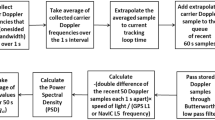Abstract
We describe a demodulation scheme for the navigation message of GPS receivers on spin-stabilized rockets. Doppler frequencies due to fast and complex dynamics, in particular high-rate spin, cause errors in carrier frequency tracking. The effects of such errors on navigation message demodulation are described through theoretical analysis and numerical simulation. A demodulation scheme that includes a frequency estimator is proposed to account for frequency tracking errors. It is demonstrated that demodulation performance is degraded 5 dB due to frequency uncertainty. Simulation results showed that a demodulator which includes maximum likelihood (ML) frequency estimator achieves near-optimal symbol error rate under these conditions. Demodulation with ML estimator achieves a bit error rate below 10−5 for a C/N 0 = 35 dB–Hz, for spin rates below 2.7 Hz, and a rocket radius smaller than 1 m. For the cases in which computational capabilities of the on-board GPS receiver is insufficient to implement the demodulator with ML estimator, frequency estimation methods with low complexity were also tested through numerical simulation. The proposed Kay and Quinn-Fernandes combination achieves a bit error rate below 10−5 for a C/N 0 = 37 dB–Hz while requiring 1/10 of processing time.













Similar content being viewed by others
References
Ebinuma T, Saito H, Tanaka K, Miyoshi T (2009) GPS signal tracking on spinning vehicles with antenna diversity techniques. In: Proceedings of ION GNSS-2009, pp 1413–1418
Enderle W (2000) A simple and low cost two-antennas concept for the tracking of a sounding rocket trajectory using GPS. In: Proceedings of ION GPS-2000, pp 376–383
Floyd G (2005) Phaselock techniques, 3rd edn. Wiley, New Jersey
Kaplan ED, Hegarty C (2006) Understanding GPS: principles and applications, 4th edn. ARTECH HOUSE, London
Kay S (1989) A fast and accurate single frequency estimator. IEEE Trans Acoust Speech Signal Process 37(12):1987–1990
Misra P, Enge P (2001) Global positioning system, signals, measurements and performance. Ganga-Jammuna Press, Massachusetts
Montenbruck O, Markgraf M (2004) Global positioning system sensor with instantaneous-impact-point prediction for sounding rockets. J Spacecraft Rockets 41(4):644–650
Proakis JG (2000) Digital communications, 4th edn. McGraw Hill Companies Inc., New York
Quinn BG, Fernandes JM (1991) A fast efficient technique for the estimation of frequency. Biometrika 78(3):489–498
Acknowledgments
This work was supported by JSPS Global COE Program and JAXA Open Lab program. Authors would like to acknowledge Space Link Ltd. for their support and assistance.
Author information
Authors and Affiliations
Corresponding author
Rights and permissions
About this article
Cite this article
Harima, K., Saito, H. & Ebinuma, T. Navigation message demodulation for GPS receiver on-board spinning rockets. GPS Solut 16, 495–505 (2012). https://doi.org/10.1007/s10291-011-0250-8
Received:
Accepted:
Published:
Issue Date:
DOI: https://doi.org/10.1007/s10291-011-0250-8




